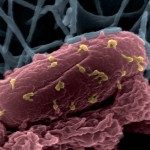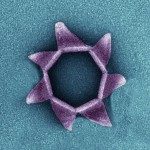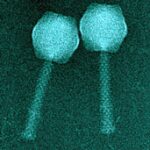Lien vers Pubmed [PMID] – 28498372
ISME J 2017 May;
Although the evolution of tailed bacteriophages has increasingly been better understood through comparisons of their DNA sequences, the functional consequences of this evolution on phage infectious strategies have remained unresolved. In this study, we comprehensively compared the transcriptional strategies of two related myoviruses, PAK_P3 and PAK_P4, infecting the same Pseudomonas aeruginosa host strain. Outside of the conservation of their structural clusters, their highly syntenic genomes display only limited DNA similarity. Despite this apparent divergence, we found that both viruses follow a similar infection scheme, relying on a temporal regulation of their gene expression, likely involving the use of antisense transcripts, as well as a rapid degradation of 90% of the host non-ribosomal mRNA, as previously reported for PAK_P3. However, the kinetics of the mRNA degradation is remarkably faster during PAK_P4 infection. Moreover, we found that each virus has evolved specific adaptations, as exemplified by the distinct patterns of their core genes expression as well as the specific manipulation of the expression of iron-related host genes by PAK_P4. This study enhances our understanding of the evolutionary process of virulent phages, which relies on adjusting globally conserved ancestral infection mechanisms.The ISME Journal advance online publication, 12 May 2017; doi:10.1038/ismej.2017.63.






